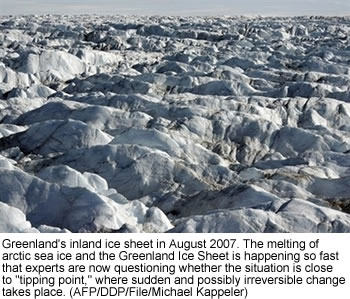The volumes of the Greenland Ice Sheet and ice in the Arctic Ocean were estimated at 2.9 million and 4.4 million cubic metres respectively in September 2007 — the lowest ever levels recorded, the organization said Wednesday.
The sea ice shrank to 39 percent below its 1979-2000 mean volume, it said.
“Recently observed changes are happening at rates significantly faster than predicted” by the 2005 Arctic Climate Impact Assessment (ACIA) and last year’s report by the Intergovernmental Panel on Climate Change (IPCC), WWF said.
The melting of arctic sea ice and the Greenland Ice Sheet was happening so fast that experts were now questioning whether the situation is close to “tipping point,” where sudden and possibly irreversible change takes place.
“When you look in detail at the science behind the recent Arctic changes it becomes painfully clear how our understanding of climate impacts lags behind the changes that we are already seeing in the Arctic,” said Martin Sommerkorn, one of the authors of the report.
The WWF will present its report, comprised of the latest research in the region, to the meeting Thursday of the Arctic Council, which groups Canada, Denmark, Finland, Iceland, Norway, Russia, Sweden, and the United States.
The conservation group’s researchers also warned of the devastating effect the rapid melting of the arctic ice could have on polar bears in Canada, where two thirds of the world’s population of the animals live.
“Previous models had predicted that melting sea ice would mean some polar bear populations could become extinct by 2050. The new evidence points to even earlier regional extinctions,” said Peter Ewins, director of species conservation at WWF-Canada.
The Committee on the Status of Endangered Wildlife in Canada will present the government with its estimates of the status of polar bears there on Friday.
Copyright © 2008 Agence France Presse

